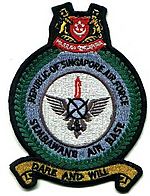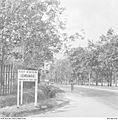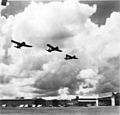Sembawang Air Base facts for kids
Quick facts for kids
Sembawang Air Base
|
|||||||||||||||
|---|---|---|---|---|---|---|---|---|---|---|---|---|---|---|---|

Badge of the Sembawang Air Base
|
|||||||||||||||
| Summary | |||||||||||||||
| Airport type | Military airbase | ||||||||||||||
| Owner | Government of Singapore | ||||||||||||||
| Operator | Republic of Singapore Air Force | ||||||||||||||
| Location | Sembawang, Singapore | ||||||||||||||
| Elevation AMSL | 26 m / 86 ft | ||||||||||||||
| Coordinates | 01°25′31″N 103°48′46″E / 1.42528°N 103.81278°E | ||||||||||||||
| Runway | |||||||||||||||
|
|||||||||||||||
The Sembawang Air Base is a military air base in Singapore. It's located in the northern part of Sembawang. This base is super important for the Republic of Singapore Air Force (RSAF). Its motto is Swift and Resolute, which means fast and determined.
Contents
History of Sembawang Air Base
Early Days as RAF Sembawang
Before Singapore became an independent country, this air base was run by the Royal Air Force (RAF) from the United Kingdom. It was called RAF Sembawang. It was also known as HMS Simbang for the Royal Navy's Fleet Air Arm. This was a place where pilots from aircraft carriers could rest and get their planes fixed. These carriers often docked at the nearby Singapore Naval Base.
World War II and Beyond
During World War II, when Japan took over Singapore, the Japanese Navy Air Service used RAF Sembawang. After the war ended in September 1945, the British got the air base back.
RAF Sembawang played a big role in keeping Britain's military strong in Asia. It was important during conflicts like the Malayan Emergency (1948–1960), the Brunei Revolt in 1962, and the Indonesia–Malaysia confrontation (1962–1966).
Becoming Sembawang Air Base (SBAB)
In 1971, the air base was given to Singapore's own air defence force. It was then renamed Sembawang Air Base (SBAB). For a few years, British, Australian, and New Zealand forces also used the base. This was part of an agreement called the Five Power Defence Arrangements.
In 1983, Sembawang Air Base became a special base just for helicopters. The first helicopter squadron, 120 Squadron, moved there permanently. Later, in the late 1990s, the base expanded.
What Happens at Sembawang Air Base Today?
Today, Sembawang Air Base is home to about 100 helicopters. Most of these helicopters help the Singapore Army and the Republic of Singapore Navy. It's the main base for all the RSAF's helicopter squadrons.
Some of the helicopters based here include:
- Eurocopter AS332 Super Pumas
- Boeing CH-47SD Chinooks
- Sikorsky S-70B naval helicopters (like the Seahawk)
- Eurocopter Fennecs
- Bell UH-1Hs (kept in reserve)
- Boeing AH-64D Longbow Apache attack helicopters
Flying Squadrons at SBAB
Here are some of the helicopter squadrons based at Sembawang:
- 120 Squadron: They fly the powerful AH-64D Longbow Apache attack helicopters.
- 123 Squadron: They fly S-70B Seahawk helicopters. These are used by the Singapore Navy but flown by RSAF pilots.
- 124 Squadron: They fly EC120 Colibri helicopters. They also have a training group at Seletar Airport.
- 125 Squadron: They use AS332M Super Puma and Airbus H225 helicopters. Some of these are set up for Search and rescue missions.
- 126 Squadron: They fly AS532UL/AL Cougar helicopters.
- 127 Squadron: They operate CH-47D and CH-47SD Chinooks, which are large transport helicopters.
The RSAF's Chong Pang Camp is also located within the air base. You can also find the famous local Sembawang Hot Spring nearby.
Photo gallery
-
Brewster Buffalo Mark Is being checked by RAF staff on 12 October 1941 at RAF Sembawang.
-
A 120 Squadron AH-64D Longbow Apache helicopter on display.
See also
- Battle of Singapore
- British Far East Command
- Far East Air Force (Royal Air Force)
- Far East Strategic Reserve
- Indonesia–Malaysia confrontation
- Former overseas RAF bases
- Malayan Emergency
- Republic of Singapore Air Force
- Singapore strategy
 | Emma Amos |
 | Edward Mitchell Bannister |
 | Larry D. Alexander |
 | Ernie Barnes |








